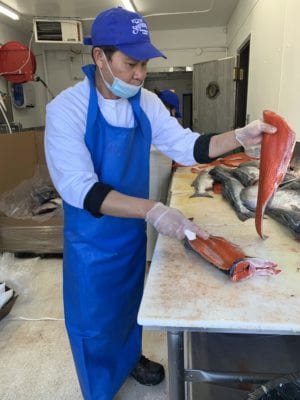
A seafood industry trade association representing major processors in the Bristol Bay wild salmon fishery says the final environmental impact statement for a Pebble mine permit is scientifically inadequate and no Clean Water Act permit should be approved.
The request to the Environmental Protection Agency to withhold such a permit unless the EIS process is redone with the necessary analytical rigor came from Chris Barrows, president of the Pacific Seafood Processors Association, in a letter of Aug. 10 to Matt Leopold, general counsel for the EPA.
“The Environmental Protection Agency has the scientific capability to more accurately assess the Pebble Project’s potential impact on Bristol Bay fisheries and fish habitat and the authority to issue a veto under CWA if the agency determines that permitting the project will have unacceptable adverse effects,” Barrows told Leopold. “We understand the NEPA (National Environmental Policy Act) process and have been participating in the process to date to support a robust and scientifically sound decision document. The process has not produced such a document.”
“PSPA and collaborating seafood processing companies submitted extensive, detailed comments (dated June 28, 2019) on the draft environmental impact statement (DEIS) for the Pebble project, highlighting the many ways that the DEIS did not meet the requirements of NEPA for sufficiently analyzing the direct and indirect environmental and socioeconomic impacts and effects of this project under both normal operations and catastrophic failure events,” he said.
PSPA also noted that the DEIS failed to disclose and analyze the entire geographic scope and duration of the Pebble project, a failure that fundamentally prevents an accurate analysis of any of the reasonable foreseeable adverse near term or cumulative effects on Bristol Bay’s fisheries and fish habitat,” he said.
The U.S. Army Corps of Engineers should withdraw the DEIS, reinitiate an analysis based on scientific data and other evidence at the appropriate scope and depth, and issue a revised draft, he said.
PSPA represents eight major shoreside and mothership seafood processing companies with operations based in Alaska and Washington state who purchase, process and market millions of pounds of seafood annually, including wild Alaska salmon, Alaska Pollock, Pacific cod, crab, halibut, rockfish and other species. Collectively they operate 25 facilities in 15 coastal communities in Alaska and three floating processors.





